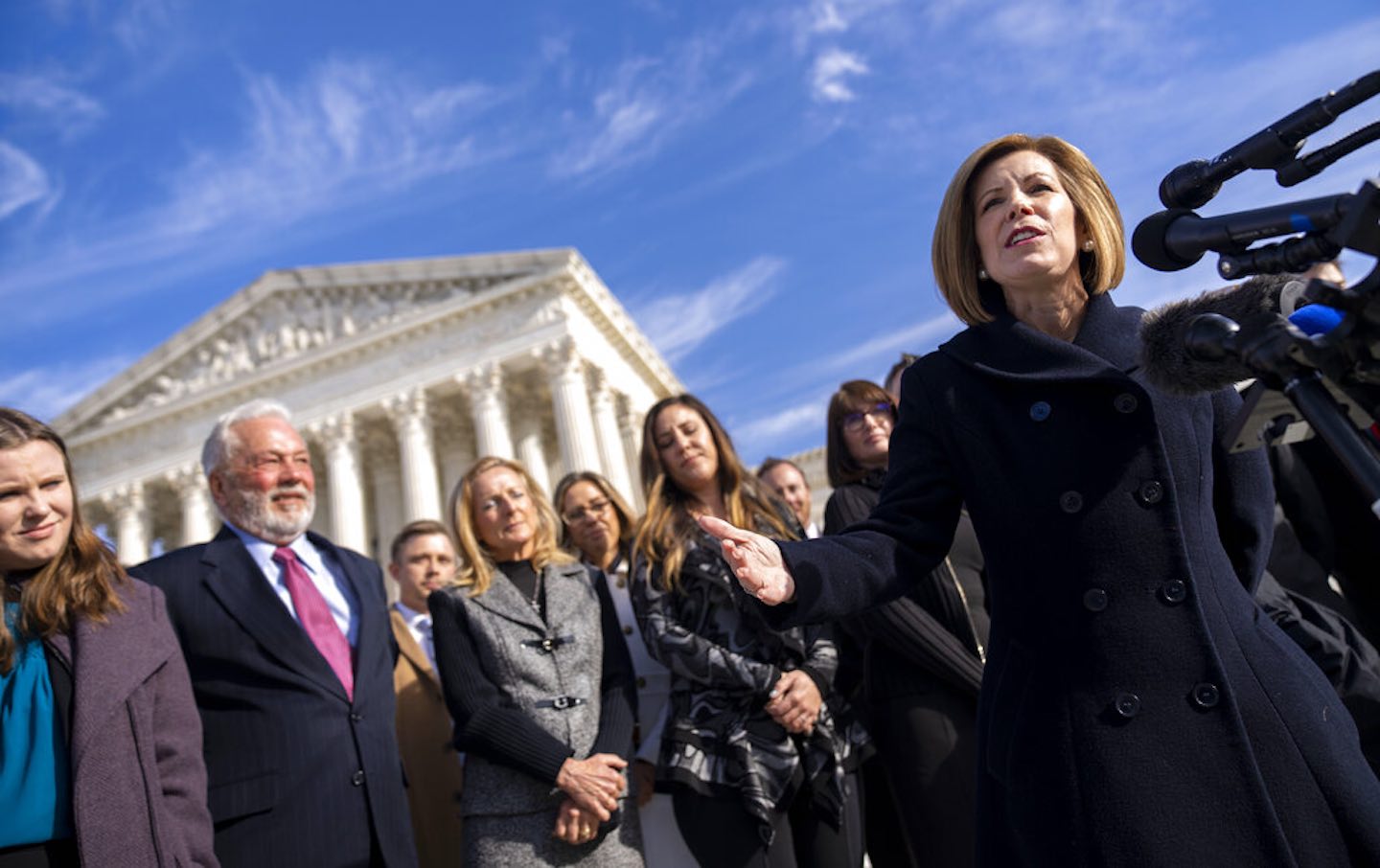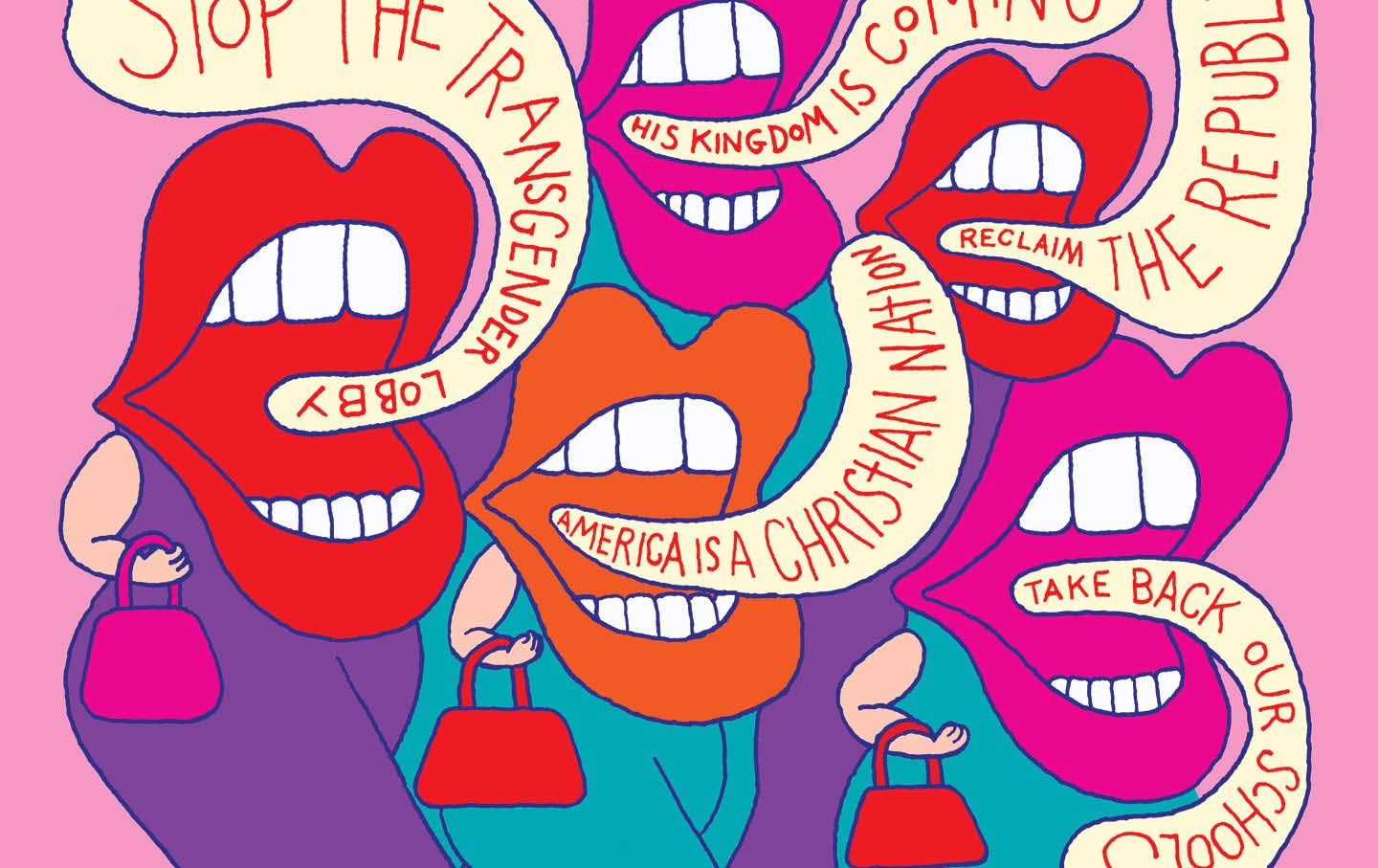The Vanguard Party of the Christian Right
The Alliance Defending Freedom, an evangelical legal advocacy group, is behind many of the Supreme Court cases seeking right-wing rulings.

Lawyer Kristen Waggoner of the Alliance Defending Freedom, right, speaks outside the Supreme Court in Washington in December 2022, after arguing before the court in the case of a Christian graphic artist who objects to designing wedding websites for gay couples.
(Andrew Harnik / AP Photo)Most analyses of the right-wing transformation of the Supreme Court begins and ends with the supply side of the equation—the recruitment, vetting, and appointment of loyal ideologues of the right to the high court. Lately, however, a pair of major investigative stories have plumbed the demand side—examining how litigators affiliated with the Alliance Defending Freedom, a vanguard evangelical legal advocacy group, develops test cases and legal strategies to establish an impermeable new judicial consensus around the group’s pet culture war crusades, from public prayer and limitations on trans rights to the repudiation of reproductive freedoms.
New Yorker writer David Kirkpatrick delivers an exhaustive profile of the group—best known for its central role in securing the reversal of Roe v. Wade in the Supreme Court’s 2022 decision in Dobbs v. Jackson Women’s Health Organization—and its lead counsel and chief executive Kristen Waggoner. Washington Post reporters John Swaine and Beth Reinhard, meanwhile, have documented the group’s predilection for Potemkin plaintiffs—people conscripted into duty to serve as conscience-stricken Web designers or wedding videographers over the course of a test case’s lifespan, and who then move on to other pursuits or locales after they’ve hit their mark in the culture-war legal drama du jour. Both accounts make for bracing reading in this age of unhinged, MAGA-fied Kulturkampf, when any and all efforts to mitigate discrimination, secure choice, and uphold church-state separation get branded as the sinister handiwork of “secular-liberal tyranny,” as Kirkpatrick puts it.
The ADF is a lavishly funded and staffed operation. Over the span of 12 years, Kirkpatrick reports, the group has seen its annual revenues triple, to more than $100 million; it now boasts around 70 in-house lawyers, “including the former solicitors general of Michigan and Nebraska and the former United States Attorney for Missouri.” An additional 4,900 attorneys are counted among its “network of allies,” Kirkpatrick writes. It recruits young lawyers from prestigious schools and places them in high-powered clerkships, including posts for sitting Supreme Court justices Samuel Alito and Amy Coney Barrett. Most of all, the group has clocked a stunning run of precedent-setting high-court wins: “In the past dozen years, its lawyers had won fourteen Supreme Court victories, including overturning Roe v. Wade; allowing employer-sponsored health insurance to exclude birth control; rolling back limits on government support for religious organizations; protecting the anonymity of donors to advocacy groups; blocking pandemic-related public-health rules; and establishing the right of a baker to refuse to make a cake for a same-sex wedding.” Its most recent victories came in a Texas case to strike down FDA rules permitting the abortion drug mifepristone to go out to patients via the mail, and in a Colorado case upholding a Web designer’s (hypothetical, as it turns out) right to withhold services from gay couples.
The group’s overall vision of embattled religious autonomy is neatly conveyed in its name: The freedom it’s vigilantly defending is that of orthodox Christian believers, perennially poised for marginalization or exclusion at the hands of the soulless secular state. (The group was founded in 1992 with the anodyne name Alliance Defense Fund; it adopted the more confrontational Freedom branding in 2012.) And this is precisely why the ADF’s strong reliance on stunt-casted plaintiffs is so telling: If America were, in fact living through a reverse-negative version of The Handmaid’s Tale, a group as firmly positioned and robustly staffed as the ADF wouldn’t need to scour the ranks of evangelical professionals to launch groundbreaking test cases; its tip line and far-flung network of allies would both be overflowing with righteous plaintiffs. Yet most of its signature cases feature plaintiffs all but brought over from central casting. Post reporters Swaine and Reinhard found that, in the high-court petition for the Colorado website case, ADF attorneys cited state level challenges to antidiscrimination laws protecting LGBTQ+ citizens that involved two wedding photography vendors who had closed up shop, and another that hadn’t taken on a new client in two years. The group also took an active hand in founding and incorporating other companies mounting similar legal challenges, Swaine and Reinhard write, and in some cases, “promoted…its lawsuits with videos and images of plaintiffs photographing women in bridal gowns at what The Post found were staged events featuring ADF employees.”
This tight vertical integration extends well beyond the staging of promotional videos; ADF attorneys helped draft the 15-week abortion ban that supplied the basis for the abortion-rights challenge in Dobbs, and then proceeded to represent the plaintiffs in the case. ADF officials told the Post that the group was following the same basic playbook pioneered by liberal advocacy groups who have, for example, persuaded Black applicants to put in for government jobs in white suburban municipalities in order to bring later antidiscrimination actions, or similarly situated applicants seeking to get apartments in residential housing claims. It’s true that it’s not uncommon for attorneys to enlist ideal-type witnesses for major cases, and to coach and massage their allegations for maximum court impact and public sympathy. Even the best known anti-evangelical court ruling, The State of Tennessee v. John Thomas Scopes, revolved around a high school teacher defendant prompted to violate the state’s anti-evolution teaching law at the behest of a consortium of secular liberal activists.
Yet such examples point up a key difference between the traditional choreographing of test cases and ADF’s practices. These model antidiscrimination and intellectual freedom suits were, after all, meant to draw forth fresh evidence of already established patterns of prejudice and state interference; the ADF is stage-managing individual crises of conscience in situations and professional settings where no such enduring pattern clearly exists. It’s a brand of litigation as agitprop, in other words, seeking to dramatize the impression of grievance on the surface of a fabricated narrative of rampant anti-religious oppression. “When you’re accustomed to privilege, asking for equality feels like discrimination,” says Rachel Laser, president and CEO of Americans United for the Separation of Church and State, which has faced off against the ADF in many of its marquee test cases. In one of the most recent such cases—the Supreme Court ruling in 303 Creative LLC v. Elenis finding a religious right to deny web services to LBGTQ clients—Laser notes that the cause of action was “completely hypothetical. When [Americans United] litigates cases, we have serious heartburn around the standing phase. We’re held to incredibly high standards every time. The same rules don’t apply to the shadow network, because they have cronies—and I mean real cronies—right there on the bench.”
Indeed, Supreme Court Justice Amy Coney Barrett, while teaching law at the University of Notre Dame, had spoken over five summers as part of the ADF’s Blackstone program, training first-year law students in Christian doctrine. She received a lexicon detailing proper usages for program lecturers, as follows: “instead of ‘sex education,’ say ‘sexual indoctrination’; instead of ‘gay marriage’ and its ‘advocates,’ say ‘marriage imitation’ and ‘opponents of marriage’; instead of ‘transgender,’ say ‘cross-dressing’ or ‘sexually confused’; instead of ‘gay and lesbian civil rights movement,’ say ‘homosexual agenda.’” During her 2020 confirmation hearings, Coney Barrett implausibly claimed she didn’t know that the ADF sponsored the gatherings, and contended she did not investigate the political profile of groups sponsoring her speaking engagements.
This kind of cronysim isn’t confined to the high court, Laser notes: “There’s a great overrepresentation of Christian nationalist judges in the lower courts,” which helps to speed test cases on their way to the Supreme Court docket. “It’s a dangerous moment.”
The plaintiffs in some ADF test cases have seemingly graduated into full-bore agitprop work for the evangelical right. One suit the group brought in 2016 involved a pair of Phoenix-based artists who’d recently founded a stationers’ business called Brush & Nib; the Arizona Supreme Court eventually ruled in 2019 that the artists couldn’t be compelled to supply stationery for gay couples planning to marry. The two artists reported that ADF lawyers helped draw up their work contract and the policy document at the center of the case. They also claimed that they brought the suit after a public records request turned up past instances of the city of Phoenix punishing businesses who had run afoul of antidiscrimination laws; another ADF-affiliated attorney handled that public-records request. Brush & Nib also went dark not long after the Arizona Supreme Court ruling; the Post reports that for the past year, its website directs users to an Indonesian gambling site. One business model remains sturdy, though: “Even before the win, one of the artists co-founded a conservative polling and PR firm, a firm that has since worked for ADF and several prominent Arizona Republican politicians.”
Most of the other major players in this field of litigation are likewise steeped in the funding nexus of right-wing culture warfare, Laser says. “It all frankly follows the same playbook of moves that this entire shadow network is supplying, because they all know now that the Supreme Court is the place to go.” In Kennedy v. Bremerton ruling, the recent high court decision affirming a Washington public school football coach’s right to hold public on-field prayers for his team, the plaintiff was no longer even working at the same school at the time of trial. “That case should have been mooted, because Kennedy had moved to Florida, but the court didn’t take the motion to moot seriously.” The ADF didn’t lead this challenge—another called the First Liberty Institute did— but it scarcely mattered, Laser says; the shadow network had by now had rendered the whole review process so airtight that the lead legal players are virtually interchangeable. “We added up the funding behind all the groups who submitted briefs on behalf of Coach Kennedy, and it totaled more than $1 billion.” After winning his case, Kennedy wrote to his old school to tender his formal resignation; like so many other plaintiffs in these cases, he’d served his purpose, and the group moved on to solicit fresh new ones.
For all the elaborate stage managing surrounding this arm of religious litigation, Laser still draws inspiration from the desperation behind these efforts. “They must be truly paranoid, if they have to make up cases, ring the alarm bell, and twist the facts this way in order to have a winning argument,” she says. “That’s pathetic.” In other ways, though, she says their track record can be worth emulating. “We have to be willing to play the law game. We have to keep bringing cases like the Missouri lawsuit challenging state abortion bans on church-state separation grounds. Even if we don’t win now, we know it’s part of changing the zeitgeist and making it clear that you cannot pass laws that violate church-state separation.” She points to another recent high-profile religious-rights victory as an example of how precedents get set: “Look at the Carson v. Makin case, which ruled that if you’re funding private schools through vouchers, you also have to fund private religious education the same way. The American Center for Law and Liberty brought the same case in the 1990s and the 2000s. They lost both times, but they stuck with it, their funders stuck with it, and kept trying to normalize something that was not normal—and they finally won.”








